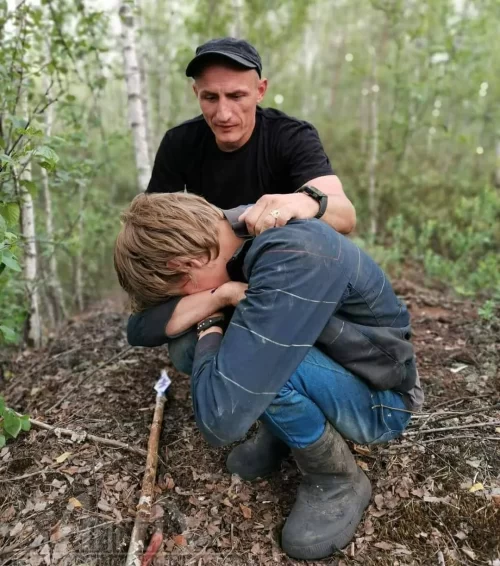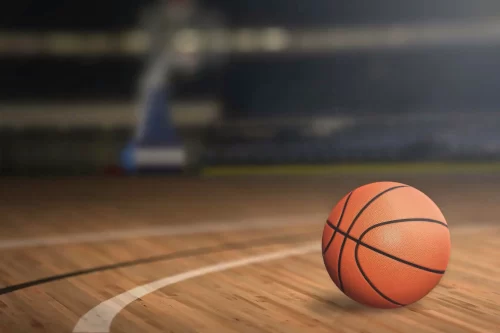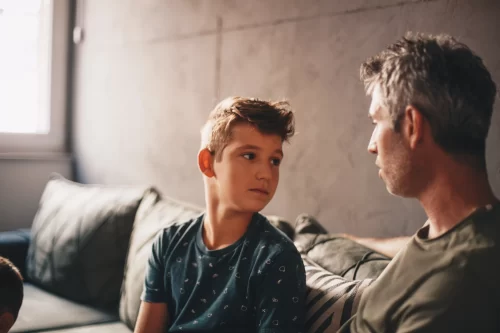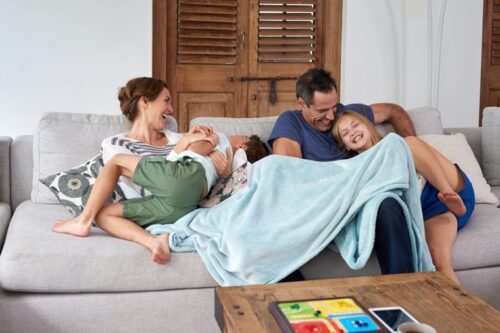Most Important Parenting, When It Appears The Least
Parenting time
Parenting
Tough Times, Not Halmark Moments, Matter Most
by Gregory A. Barrett, M.D.
Strange as it may seem, there will be times in your children’s lives when they actually need you. And by that I don’t mean just putting a Band-Aid on a scraped knee. No, I am referring to the rough patches. Life is never an eternal bed of roses, and the thorny periods which arise for all of us can be particularly painful for a child. Furthermore, they tend to come without warning, making it important that parents remain alert to their son’s or daughter’s emotional state.
It is inevitable that a predicament of some sort will crop up for your child, and the root cause most often is social. It could be the loss of a best friend, an unexpected rejection, not getting a part in a school play, or any of a number of other possibilities. The amount of distress caused when this happens can be incredible. One must be sensitive to the fact that although the event might not seem like such a big deal to you with your greater life experience and perspective, to your child it may well be MAJOR! Do not – repeat, DO NOT – trivialize their feelings.
Being There A Priority

When your child suffers a setback the natural instinct for him or her will be to withdraw. And that is fine. What the parent must do is to immediately readjust their own schedule and make their son or daughter their number one priority. You have a role to play, and that is to provide a safe emotional harbor. It is also important to be subtle about what you’re doing; don’t openly embarrass your child about their neediness. Step into the temporary role of being their best friend and confidante, providing whatever support is necessary. Help them see themselves as funny, bright, and attractive. Demonstrate that there is no place in the world you’d rather be than in their company. Now, this may go on for just one evening, a week, or even months, but for whatever period of time it lasts, you need to be there for them. It goes without saying that as soon as the crisis passes you will instantly be dropped like a hot potato, and they will return to their peer group. But hey, come on, that should have been your goal from the start, right? And for heaven’s sake, when that happens don’t get your feelings hurt! You’re an adult, you can handle it. Although it likely won’t be acknowledged at the time, they will always be appreciative. It’s these tough times, not the Hallmark moments, that will matter the most in the long run.
My daughter Rachel was always naturally gregarious. Friends mattered to her greatly. Cute, bright, friendly, and outgoing, she ran with the in-crowd, the popular girls at school. That is, until she hit the wall in middle school.
It all started with a routine annual check-up. Although otherwise in excellent health, Rachel was discovered to have a significant scoliosis in her upper spine. The condition proceeded to progress rapidly during her adolescent growth spurt. Ultimately the orthopedist determined that she would need to wear a custom-fitted plastic body brace until her growth was completed, at which time she would require corrective surgery. Along with the cumbersome mechanics of the device itself came a fashion issue we had failed to anticipate. Rachel was going to have to go through eighth grade dressed exclusively in oversized blouses and skirts. Even more embarrassing, the brace had to be removed and then re-applied by a classmate every obligatory gym period. Unable to wear the uniform dictated by the conformity of the day, she stood out like a sore thumb. And it didn’t take very long before her condition elicited the predictable “mean girl” response. Rachel was rudely dismissed from the group. Overnight, she became shunned.
Parenting, A Lighthouse In A Storm

These were, in many ways, her darkest days. Rachel was utterly friendless. Her parents became her only social outlet in the months that followed. We did what we could to entertain and distract her; we took little trips, went to movies, watched videos together, and became a part of her life to a greater degree than ever before. It actually was kind of fun for me personally. I loved her so, and it was cool once again to feel as if I were important to her. But although she tried hard to act brave, her loneliness was heart wrenching.
Nothing lasts forever, thankfully, and one school lunch period she ambled over to a group of outcasts and introduced herself. They were the theater crowd, kids who didn’t really fit in with the “in-group,” and could not have cared less. To them it was cool to be different. A girl with scoliosis who could only wear skirts? No big deal. Rachel was immediately accepted, and her life took off in a new and decidedly better direction.
The surgery was successful. The body brace was summarily banned to the attic, never to return. And Rachel came out of the experience a wiser, more empathetic, and far better person. In addition, she gained a lifelong friend she would never have met otherwise.
Recounting this episode with Rachel triggered a memory of something that happened in my own life a long, long time ago. But to fully understand this story I need to explain a few things about my father.
In many ways, Dad and I couldn’t possibly have been more different. First of all, physically, we were like Mutt and Jeff. He stood five foot eight, fully stretched out on the longest day of his life, and was built like a rock; I was, and still am, a 6’4″ string bean. He was bald by the age of thirty, and had his little fringe buzzed close to the skull every two weeks. I wore my hair long, typical of the time. He was country music—I was rock and roll. Dad was a mechanical engineer, extraordinarily gifted with machines. He could fix anything that was broken. I still to this day take considerable pride in being able to successful hang a picture on the wall without breaking something. My father never read anything except the newspaper. At my urging he finally read a novel from start to finish at the age of sixty-four. “Pickwick Papers,” by Charles Dickens. It took him over ten months, but he did it. And then he proceeded to talk about it for the next twenty years…. Meanwhile, I was one of those kids with their nose constantly buried in a book from the moment I learned my letters.
Parenting, Action Louder Than Words

My father was the prototype for strong and silent. I was born talking and haven’t stopped since. As a young boy I never once had what one would call a meaningful conversation with him, or a talk of any substance. This is in no way meant as a condemnation. He did things with me – played catch, went fishing, attended baseball games. We had a perfectly fine father-son relationship, typical of the times.
These were the sixties, you see, and families were structured far differently than they are today. We all had stay-at-home moms – or housewives, as they were known back then – and they took care of us. The dads worked. They were the breadwinners, the providers. They mowed the lawn in the summer, shoveled the snow in the winter, changed the oil on the cars, complimented the wives on their cooking, went to Lodge meetings or the equivalent, and just sort of managed things around the house. They never really talked to us, at least not about anything important. Certainly not about our feelings. That simply wasn’t part of their job description. All of that stuff, if it ever needed to be done, was left to the mothers. No, the dads of my childhood were not the highly involved fathers of today. But mine was an excellent father. He was solid, dependable, moral, and decent. I both admired and respected him.
One final area where we differed greatly was in the area of athletics. Although my dad liked watching sports, he was perhaps as un-athletic a male as I’ve ever known. He simply had no eye-hand coordination whatsoever. I guess I was lucky to have escaped the Barrett curse on that count and inherited my mother’s genes. Not only did I enjoy playing sports, but I also had at least some level of competence. And my special love was basketball.
I had a great season on the ninth-grade team and was eagerly looking forward to my sophomore year with realistic hopes of making the varsity. Or perhaps even more. One could dream, couldn’t one? I participated in the rigorous fall conditioning program and practiced on my own religiously. As the tryouts began in early November I was initially placed with the varsity. So far, so good.
Parenting Perspective

Then disaster struck. My right elbow turned red, swelled to the size of a cantaloupe, and sent an electric shock of pain up my arm with the slightest touch. I was unable to perform even the simplest of drills, and the disgust on the faces of the coaches was readily apparent. After a couple of weeks, I was summarily called into the office and informed, in the most unsympathetic tone imaginable, “Barrett, you’re not doing us any good up here, so I’m cutting you. You’re going down to the junior varsity.”
And just when you think things can’t get any worse – they get worse. Not only did I find myself on the JV, but I was to be a reserve. Even after the bursitis healed, for the first time in my athletic life, I wasn’t starting.
I was devastated. It appeared that my lifelong dream of becoming a basketball player had been destroyed. Being a sixteen-year-old kid, I wasn’t about to cry to my parents or openly whine about my disappointment. I was determined to respond to my mother’s queries with false enthusiasm in as few words as possible. “It’s going fine.” “Practice was fine.” “The coach is fine.” “I think we’re gonna be pretty good.” Mom appeared to cheerfully accept my answers at face value. I sensed that my father was silently studying me out of the corner of his eye, but I didn’t make much of it at the time. Anyway, there was no way either of them could have imagined the extent of my suffering.
Much to my dread the evening of the first game arrived and, as expected, I spent the entire night on the bench. I felt utterly humiliated. The rest of the guys hurried through their showers and headed off to the school dance. That wasn’t an option for me, as at that age I was still FAR too shy to even try talk to a girl, much less actually dance with one. No, I was heading home. In disgrace. All I wanted to do was climb into bed, pull the covers over my head, and make the world go away.
I trudged up to the front of the house through a dreary, early December snowfall foreshadowing, I assumed in my misery, the onset of a lousy winter. My life was at an all-time low – sports, friends, school, everything. As I arrived at the door, I was astonished to have it opened by my father wearing his tattered white apron.
“Hey, Dad. What’s going on?” I inquired.
“Are you hungry?” he asked gruffly.
(FYI, for all future comments made by my father you may add the adverb ‘gruffly,’ as he only had one tone, and that was gruff. Meanwhile, back to the story.)
“Uhh, sure,” I replied.
“Okay. Why don’t you hang up your coat and come join me.”
“Alright,” I said with a shrug, complying with his request despite desiring only to seek out the solitude of my bedroom.
I joined him in the kitchen of our modest ranch and was further surprised by the sight of my father taking some ground beef out of a package, molding a couple of half-pound patties, and then frying them in a pan. In retrospect, I suppose, that sounds fairly gross, but at the time they smelled pretty darned good.
I sat quietly watching as he prepared the meal. When the hamburgers were ready, he placed them on plates and sat down beside me. Dad was a farm boy from northwest Missouri, a no-frills kind of guy, so we ate them his way. No cheese, no condiments, just the plain, unadorned burger placed simply on a bakery bun, accompanied by a pair of napkins and a pitcher of ice water.
As we ate the two of us talked, mostly about the game. After a while we gradually expanded the discussion to the people and events of the time. Martin Luther King and the Kennedys, the Beatles and Johnny Cash, the civil rights movement, the space program and, of course, the war.
It was around midnight when he arose from the table and said, “Well, I guess I’d better clean up this mess.”
“Here, Dad, let me help you,” I offered.
“Thanks, son.”
As I laid down in bed that night, I realized that something extraordinary had happened. My father had somehow elevated me. And my world seemed brighter because of it.
One week later, as I walked up the steps to our house lugging my gym bag and my disappointment, I found myself wondering if it would happen again. Before I even reached the porch Dad had opened the door, wearing his grungy old apron with spatula in hand, and said, “Hi, Greg. Are you hungry?”
He had been waiting for me.
“You bet,” I smiled.
Every game night for the rest of the season, Fridays and Saturdays, home and away, the two of us repeated our ritual. The menu never changed. We would eat our burgers and quietly talk for an hour or so. I have no idea where my mother and sister were at the time. In their bedrooms, I would assume. All I know is that they left us alone, and with each passing week the bond between my father and I grew stronger.
After the games that season my teammates would shower and laugh as they made plans for the remainder of the evening. Some were headed to parties, some to their girlfriends, and some out for an evening of beer drinking. As for me, I declined all offers and invitations. You see, I had some other place I’d much rather be.
Talk Time

I suppose it’s possible that Dad never truly understood what he was doing at the time. I mean, he was never what you’d call a really insightful kind of guy. Or perhaps I’m underestimating him. I don’t know. Maybe he knew exactly what he was doing. Although as the years passed, we became quite close, we never specifically discussed it. And he’s gone now, so I guess I’ll never know for sure. Oh, well. But, consciously or not, his actions on those cold winter nights conveyed several clear, unmistakable messages. One, he knew I was hurting. Two, I was important to him. And three, in spite of everything, he was proud of me.
My time as a bench-warmer proved to be short-lived. It wasn’t long before I was a starter again, and we went on to have a very successful season, both the team and I.
It’s interesting, though, how whenever my thoughts drift back to that period of my life, it’s not the basketball I recall.
There is a world of truth embedded in the title of this essay. It is ironic how we parent the most when it seems we are parenting the least. Strange, isn’t it, how often it’s the little things in life that truly matter? Sacrificing your leisure time to attend an Indian Princess camp-out with your daughter, kibitzing with the other fathers while she plays with her friends? I suppose there are a lot worse ways to spend a weekend. Being elected President of the PTO at your child’s school? Well, good for you, I guess. Getting all dressed up and attending a father-son or mother-daughter banquet? That’s nice, and of course you should be commended. But putting aside the newspaper to look at a picture your child just drew and wants to share, giving your undivided attention to a story about an incident that happened on the playground, or providing a shoulder to lean on – or cry on – in times of need? Priceless.
Pay attention to your children’s moods no matter what else is transpiring in your own life. When you sense they are going through a rough spell, put everything else aside. Be there for them when they need you. It won’t be easy, but that’s okay. This is when parents truly earn their stripes.
And remember, never underestimate the importance of the little things. In the end it will be those small moments of kindness and attention that make all the difference. They will become their warmest memories.
I have had a blessed life in many ways – particularly on the food front. 🙂 It has been my great fortune to have dined in a number of amazing restaurants, feasted in exotic locations, and had some truly remarkable meals. However, as I reflect back, nothing I have ever eaten has tasted quite so wonderful as those late-night fried burgers I shared with my father at our kitchen table so many years ago.
You see, we were just talking.
Yep.
Just talking.
Me and my dad…
☤
Gregory A. Barrett, M.D.

Gregory A. Barrett, M.D. has had the unusual blessing of training, living and working all in one city: Columbus Ohio. First a BS in English then his medical degree from the Ohio State University college of Medicine in 1978. He followed that with both an internship and residency in Pediatrics before he set up practice both in Columbus.
He is a Clinical Associate Professor at OSU and has received its Distinguished Educator Award. He has served as Chairman of the Department of Pediatrics at Riverside Methodist Hospital and is the past school physician for Upper Arlington Schools. He is a founder and Executive Board member of Central Ohio Primary Care, the largest privately owned primary care physician group in the United States.
During medical school, in 1976, he met and wed Darla Hall, an elementary school guidance counselor from Youngstown, Ohio. They obtained their degree in parenting by raising two children, Rachel and Keith, whom he used regularly in his writing and bragged that “they turned out okay.” Darla passed in April, 2008, from complications of breast cancer.

